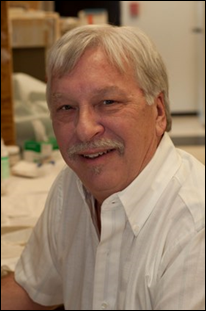Larry Sparks, of Alzheimer’s-Cholesterol Fame, Dies at 63
Quick Links
Alzheimer's disease researchers expressed sadness this week at the sudden death of Larry Sparks, senior scientist at the Banner Sun Health Research Institute, Sun City, Arizona, at the age of 63. Sparks worked in Sun City from 1997. Sparks championed the idea that high plasma cholesterol increases the risk for Alzheimer's pathology in the brain. "Larry relished to be the out-of-the box, lone thinker," said Banner colleague Marwan Sabbagh. "Larry didn't follow trends, but stuck to his own observations and what he wanted to do. That was his niche and his strength," said Sabbagh.

Larry Sparks
That philosophy led Sparks to make a connection between myocardial infarction and AD. He noticed that people who died from heart disease were more likely to have amyloid pathology in the brain on autopsy. "He had some novel ideas about the relationship between heart disease and AD, and the role of lipids and cholesterol," said Neil Buckholtz, National Institute on Aging, Bethesda, Maryland.
Sparks got his PhD in 1982 in Buckholtz's lab at the Medical University of South Carolina in Charleston. "Larry was then, as he continued to be, an enthusiastic scientist with ideas not always in the mainstream. I have to admit there were some stormy times, and I was not always sure he was going to get his degree," recollected Buckholtz. "I am glad he did, because during his research career over the next 31 years, he made a real contribution to Alzheimer’s disease research."
Sparks oversaw one of the first clinical trials to test if cholesterol-lowering statins could benefit people with mild to moderate Alzheimer's (see ARF related news story). People who took atorvastatin over one year tended to have less cognitive decline, though the results lacked statistical significance. Sparks was also intrigued by the potential role of copper in Alzheimer's and reported that even small amounts of the metal exacerbated pathology in rabbits fed high-cholesterol diets (see ARF related news story).
Sparks was a veteran of the Vietnam war. He passed away last Sunday, a few days after suffering a brainstem hemorrhage. "He had been planning for his retirement in about a year and a half," said Sabbagh. "He will be missed."—Tom Fagan.
References
News Citations
Further Reading
Annotate
To make an annotation you must Login or Register.

Comments
Johns Hopkins University
I have some fond memories of Larry. I'll share one.
It was one of the early ICAD meetings in Minneapolis. One of the meeting events was a Twins-Orioles baseball game that turned out to be Cal Ripken's 2,000th consecutive game en route to the longest consecutive game streak in baseball history. I was sitting next to Larry. The game was a snooze, ending in a 1-0 score. There was a row of Swedish researchers sitting in front of us who were trying to understand from the comments of these two baseball "aficionados" why baseball is actually interesting (I know that Lars Lannfelt remembers this, as he reminded me of it years later). Larry shared with me during that game that he had been a semi-pro ballplayer, a catcher, but could never break into the majors "because I couldn't hit the curve ball."
Larry sure threw a few curves in his day.
Godspeed.
The University of Melbourne
Vale, Larry.
An original thinker, who made a great contribution.
University of the Saarland
Larry,
We will miss you!
Tobias
Medical University of South Carolina
The controversy and research opportunities that Larry started on the role of cholesterol in AD pathogenesis lives on. He was also a really nice and friendly person. It is very sad to see him go.
Boston University School of Medicine
My memory of Larry is at a conference in Sweden. He gave a 20-minute talk that had about 230 slides. No joke. He had the slides set to advance automatically and talked continually, stream-of-consciousness style, with the slides changing about every five seconds as he talked. It was an unorthodox, amazing performance and, of course, he delivered his views on cholesterol and AD very forcefully.
�
His death was premature. Mourning.
University of Louisville School of Medicine
Larry was a wonderful person, full of imagination, energy, spirit, thoughtfulness, and joie de vivre. I miss him and will remember him always. The field has suffered a great loss.
Make a Comment
To make a comment you must login or register.